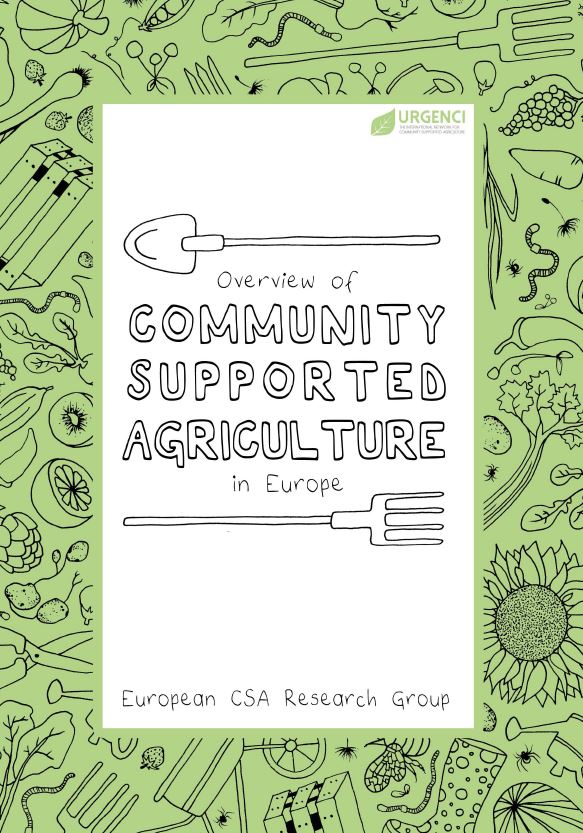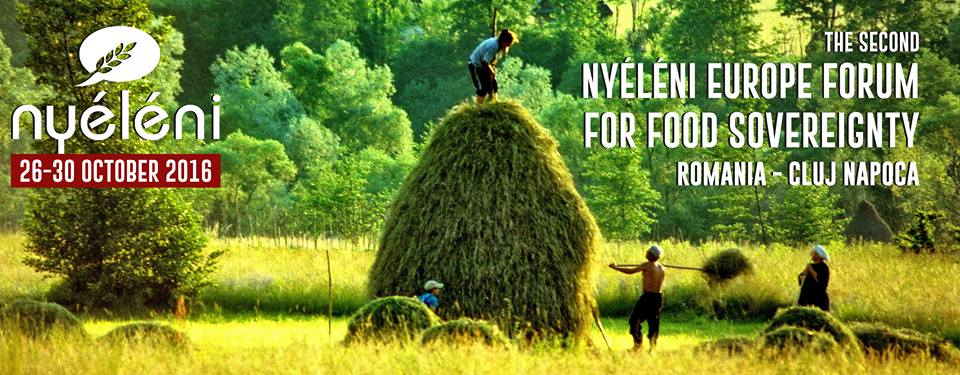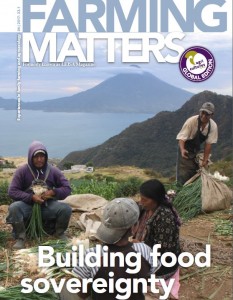FOOD SOVEREIGNTY is the right of peoples to healthy and culturally appropriate food produced through ecologically sound and sustainable methods, and their right to define their own food and agriculture systems.
It puts the aspirations and needs of those who produce, distribute and consume food at the heart of food systems and policies rather than the demands of markets and corporations. It defends the interests and inclusion of the next generation. It offers a strategy to resist and dismantle the current corporate trade and food regime, and directions for food, farming, pastoral and fisheries systems determined by local producers and users.
Food sovereignty prioritises local and national economies and markets and empowers peasant and family farmer-driven agriculture, artisanal – fishing, pastoralist-led grazing, and food production, distribution and consumption based on environmental, social and economic sustainability.
Food sovereignty promotes transparent trade that guarantees just incomes to all peoples as well as the rights of consumers to control their food and nutrition. It ensures that the rights to use and manage lands, territories, waters, seeds, livestock and biodiversity are in the hands of those of us who produce food.
Food sovereignty implies new social relations free of oppression and inequality between men and women, peoples, racial groups, social and economic classes and generations. – Declaration of Nyéléni, 2007. (Read the full declaration here..)
In the last 30 years, more and more people are defending and promoting the right to control their own food, agriculture, livestock and fishery systems, and the policies that affect those systems. ‘Food sovvereignty’ is a term that encapsulates these efforts, and that has catalysed many social movements. It entails people’s control of natural resources and markets, including access to land, seeds and water, as well as fair prices for small scale producers. Food sovereignty holds the wellbeing and local knowledge of producers and consumers at the centre of food practices and policy. Importantly, it stipulates the right to healthy and culturally appropruiated food, and values environmentally respectful production practices. Read more: Building Food Sovereignty. Farming Matters 2017. Download pdf here
Find out more on food sovereignty:
- Nyeleni Europe – the widest international movement aiming to realize food sovereignty in Europe. Boerengroep is part of the Dutch Delegation of Nyeleni Europe Forum for Food Sovereignty that will take place in October 2016, Romania.
- Via Campesina – the largest international peasant movement, which launched the concept of Food Sovereignty in 1996 during the FAO World Food Summit in Rome. La Via Campesina is an international movement bringing together millions of peasants, smalland medium size farmers, landless people, rural women and youth, indigenous people, migrants and agricultural workers from around the world. Built on a strong sense of unity, solidarity between these groups, it defends peasant agriculture for food sovereignty as a way to promote social justice and dignity and strongly opposes corporate driven agriculture that destroys social relations and nature. See also their flyer.
- Nyeleni – the international, worldwide movement for food sovereignty
- Chancellor, Chris. 2019. More farmers, better food: Nyéléni ECA releases CAP publication
- ASEED. Short booklet Towards Food Sovereignty (ENG) / Opweg naar Voedselsoevereiniteit (NLD)
- Food sovereignty – A critical dialogue (with Jan Douwe van der Ploeg, Raj Patel, James Scott, Olivier de Schutter and others) watch video online
- Peasant-Driven Agricultural growth and Food Sovereignty. Jan Douwe van der Ploeg, 2013. Download pdf “Peasant agriculture has the best credentials for meeting food sovereignty and has the capacity to produce (more than) sufficient good food in away that can satisfy the (many) objectives of producers themselves as well as for society at large.” – Jan Douwe van der Ploeg
- Van der Ploeg 2017. Importance of Peasant Agriculture. A neglected Truth. Pdf online
- Who will Feed us? The Peasant Food Web versus the Industrial Food Chain. ETC, 2017.
“Peasants are the main or sole food providers to more than 70% of the world’s people, and peasants produce this food with less (often much less) than 25%of the resources – including land, water, fossil fuels – used to get all of the world’s food to the table. The Industrial Food Chain uses at least 75% of the world’s agricultural resources and is a major source of GHG emissions, but provides food to less than 30% of the world’s people”. Download here
- Food sovereignty. Raj Patel (2009), The Journal of Peasant Studies, 36:3, 663-706. Download pdf
- Report on the ’15th Garden’ – for food sovereignty in Syria. “They tried to bury us, but they didn’t know we were seeds”. 2017. Read online
- Agriculture and Food Sovereignty in Syria. Jasim, 2017. Read online
- Hands on the Land for Food Sovereignty and Climate Justice. (Short Video online)
- María Elena Martínez-Torres & Peter M. Rosset (2014) Diálogo de saberes in La Vía Campesina: food sovereignty and agroecology, The Journal of Peasant studies, 41:6, 979-997. Download pdf
- List on Food Sovereignty here..
- Food Sovereignty: Towards democracy in localized food systems. FIAN International. Here..
- Food Sovereignty comes of Age. Africa leads efforts to rethink our food system. by UK Food Goup. Download here..
- What is food sovereignty (short document)
- Developing and strengthening the concept of peoples’ food sovereignty. Read here..
- Peoples’ Food Sovereignty Statement. Read here..
- Food Sovereignty Framework: Concept and Historical Context. Read here..
- The Contested Terrain of food sovereignty construction. Towards a historical, relational and interactive approach. Schaiavoni, 2016. Journal of Peasant Studies. Download here
- Via Campesina, 2003. Food Sovereignty: Global Rallying Cry of Farmer Movements. Read here..
- GRAIN, 2005. Food Sovereignty: turning the global food system upside down. Read Here..
- Manifesto Food Otherwise: Towards fair and sustainable food and agriculture systems. here in English / Nederlands
- Why a convention on food sovereignty. Read here..
- Put food sovereignty at the core of the EU CAP. Brussels, 2010. Download here..
- Food sovereignty, food security and democratic choice: critical contradictions, difficult conciliations, Bina Agarwal (2014). The Journal of Peasant Studies, 41:6, 1247-1268. Download here
- Over 15 years’ struggle for the recognition of peasants in the international human rights system. Read here
NYÉLÉNI 2016
- Nyeleni Europe Declaration here..
- Towards Nyeleni Europe 2016 (short film)
- Call for Second Nyéléni Europe Forum 2016 in Romania:
- Mobilization Call for the Second Nyéléni Europe Forum (English)
- Призыв к мобилизации второго Форума “Ниелени Европа” (Russian / русский)
- Llamamiento a la participación para el segundo Foro Nyéléni Europa (Spanish / Castellano)
NYÉLÉNI 2015. Declaration of the international forum for Agroecology, Nyéléni, Mali, 27 February 2015
NYÉLÉNI 2011. European Forum for Food Sovereignty
- Engels, read here..
- Nederlands, lees hier..
NYÉLÉNI 2007. 27 February 2007 Declaration of the Forum for Food Sovereignty, Nyéléni, Sélingué, Mali.
VIDEO Towards a Declaration on the Rights of Peasants. The Declaration on the Rights of Peasant Men and Women and Other People Living in Rural Areas aims to create an international human rights instrument, to improve the promotion and protection of their rights and draw attention to the threats and discrimination suffered by peasants and people involved in small-scale food production across the world. See also:
- the article by Via Campesina Over 15 years’ struggle for recognition of peasant rights in the international human rights system.
- Documents from the working group on a UN Declaration on the rights of peasants and other people working in rural ares. Here
- Blog which gives more visibility to the increasing body of knowledge which defends the rights of peasant men and women all over the world. Check: defendingpeasantrights.org
- A list from FIAN International. English / Espanol / Français
- Cetim.ch has been committed for many years to better protection and promotion of peasant rights, alongside La Via Campesina and FIAN. They have published a series of documents on the right to land, economic, social and cultural rights and civil and political rights.
VIDEO Hands on the land for food sovereignty and climate justice. Frontline communities and social movements around the world explain why we need to keep our hands on the land for food sovereignty and climate justice! They talk about the false solutions they are presented with against climate change, and the real solutions and ways forward that small-scale food producers promote.
VIDEO What does it mean to be peasant in Romania? With half of the EU’s peasants, Romania is the ideal place for the largest pan-European food sovereignty forum in history. Hundreds of farmers, peasants, pastoralists, fishers, rural youth, environmentalists and others gathered in Cluj-Napoca between the 25th and 30th of October 2016 to build common strategies in order to re-organise the way we structure our society around food and agriculture.



